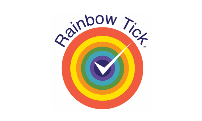LGBTIQA+* Resources
Welcome to our LGBTIQA+ dedicated page which provides resources and information about palliative care, tailored for members of the LGBTIQA+ communities.
Facing end-of-life decisions for yourself, or a loved one, can be a difficult and emotional experience.
We acknowledge that members of LGBTIQA+ communities can face a range of unique and compounding issues when accessing palliative care, including:
Historical and ongoing discrimination
- Many LGBTIQA+ people have experienced stigma and discrimination in healthcare settings, leading to mistrust of services.
- Fear of judgement or disrespect can discourage people from disclosing their identities or accessing care altogether.
Concerns about inclusive care
- Services may lack explicit inclusion policies or visible signs of safety (e.g., rainbow symbols, trained staff), leading to a reluctance to engage.
- Staff may unintentionally misgender people or fail to recognise diverse relationship structures, which can feel invalidating or alienating.
Chosen families and decision-making
- LGBTIQA+ people often rely on chosen family (non-biological, non-legal relationships) for care and support.
- These relationships may not be recognised in advance care planning or at end-of-life, potentially excluding important people from decision-making or visitation.
Legal and administrative barriers
- Documentation and systems may not accommodate diverse gender identities or family structures, making administrative processes distressing or inaccessible.
- Some individuals may be concerned about post-death recognition of identity (e.g., names, pronouns on death certificates or during funeral arrangements).
Mental health and trauma
- Higher rates of mental health challenges and past trauma (including HIV/AIDS-related loss) can intersect with palliative care needs.
- Fear of being ‘closeted’ again in care, particularly in faith-based or residential settings, can cause anxiety and impact wellbeing.
Under-representation in services and research
- LGBTIQA+ people are often under-represented in palliative care research, leading to a lack of evidence-based approaches tailored to their needs.
- There is also a lack of visibility and leadership roles for LGBTIQA+ people within health and palliative care services.
Acknowledging these issues exist, PCV is working with the sector to address them.
Resources
Our resources aim to provide you with knowledge and some tools to make informed decisions about palliative care.
The Australian GLBTIQ Multicultural Council (AGMC), together with PCV, produced three short videos, where Budi Sudarto provides an introduction to palliative care concepts for members of the Australian LGBTIQA+ multicultural and multifaith community. You can watch these videos here:
PCV and AGMC also collaborated on a research project to foster equity and inclusion among palliative care service providers for multicultural, multifaith LGBTIQA+ communities: My Choice of Care: Palliative Care from Multicultural and Multifaith LGBTIQA+ Perspectives and Experiences.
If you would like more information about palliative care, there are other resources available on our website:
External Resources
Other organisations also have resources on palliative care for members of LGBTIQA+ communities:
To find a service you can use our Find a Service Provider tool below to see which organisations service your local area.
Find a service provider
Please click on the button below to access our service provider search directory.
Find a service
Your Feedback Matters
As a peak body, PCV works with providers of palliative care services to promote, advocate for, improve upon, and educate people about palliative care.
Palliative Care Victoria is working toward Rainbow Tick Accreditation and services already accredited will display this symbol:

Many other service providers, although not displaying the Rainbow Tick, have strong supports in place for LGBTIQA+ community members.
If you have experienced Palliative Care Services in Victoria – good, bad, or somewhere in between – we would love to hear from you so we can act on your feedback.
Send us your views via our contact form or give us a call on 03 9662 9644 during business hours.
* Language is a powerful tool that shapes our understanding of the world and our relationships with others. Inclusive language fosters a sense of belonging, respect, and dignity by acknowledging diverse identities, experiences, and perspectives. The words we choose can either build bridges or create barriers, making it essential to use language that affirms and welcomes all individuals.
PCV acknowledges that the LGBTIQA+ acronym does not necessarily apply to all who consider themselves part of these communities. PCV predominantly uses this acronym with respect and for consistency in communication.